|
|
|
Sort Order |
|
|
|
Items / Page
|
|
|
|
|
|
|
| Srl | Item |
| 1 |
ID:
104194


|
|
|
|
|
| Publication |
2010.
|
| Summary/Abstract |
During the years immediately preceding Israel's founding, Abba Hillel Silver was considered the most powerful leader of American Zionism. His leadership was viewed by numerous admirers as epitomising the yearning of the Jewish people after the Holocaust. However, almost immediately after Israel's foundation, he was relegated to the margins of Zionist politics; the more important reasons for this development being his status vis-à-vis the leader of the pre-state Jewish community, David Ben-Gurion, who was elevated to the revered status of the 'founding father' of the recently established state. This article discusses how Silver coped with this new situation, where only his great rival could legitimise him. After realising the futility of challenging Ben-Gurion directly, Silver decided to elevate Ben-Gurion in his speeches to the status of the ideal philosopher-king. The question is whether by doing so Silver accepted the incontestability of Ben-Gurion's charismatic leadership, or whether he was merely attempting to reinterpret Ben-Gurion's new revered status in a way that legitimised his own Diaspora leadership, thus reinforcing a very different national ideology from the Israelocentric one represented by Ben-Gurion.
|
|
|
|
|
|
|
|
|
|
|
|
|
|
|
|
| 2 |
ID:
192253


|
|
|
|
|
| Summary/Abstract |
This article describes Israel's bacteriological warfare campaign during the first Arab-Israeli war of 1948. Over the decades following that war rumours circulated that Israel had used bacteria, alongside conventional weaponry, in its battle against Palestine's Arabs and the surrounding Arab states. The declassification of files in the Israeli military archives, our discovery of a crucial letter in private hands, and the publication of a handful of memoirs relating to 1948 have enabled us to bridge the divide between rumour and fact; to explain the campaign's origins; to reconstruct its stages, beginning in April 1948; to identify who was involved – including Israel's prime minister, David Ben-Gurion and the Israeli army's de facto chief of general staff, Yigael Yadin, as well as leading Israeli scientists – and who actively opposed it; and to delineate and assess what the campaign actually achieved or failed to achieve. In sum, this study helps to understand various aspects of the 1948 War.
|
|
|
|
|
|
|
|
|
|
|
|
|
|
|
|
| 3 |
ID:
171048
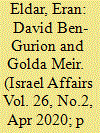

|
|
|
|
|
| Summary/Abstract |
Relations between David Ben-Gurion and Golda Meir were complex and saw many ups and downs over the years. Having enjoyed fruitful collaboration prior to and after Israel’s establishment, with Meir even appointed foreign minister at the height of her career, they were never close friends. The relationship took a steep downhill course in the early 1960s, culminating in Ben-Gurion’s secession from the ruling Mapai party and the establishment of his own rival Rafi party. This article describes and analyzes the complex relationship and the rift between these two central leaders of Mapai and its impact on the party and on the political map.
|
|
|
|
|
|
|
|
|
|
|
|
|
|
|
|
| 4 |
ID:
142755
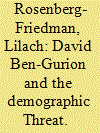

|
|
|
|
|
| Summary/Abstract |
This article illuminates one of the many facet of Ben-Gurion's leadership that had an impact on his public image – his stance on fertility and childbirth, during the years 1936–63. The article outlining Ben-Gurion's thoughts on the birthrate in Mandatory Palestine and the State of Israel, analyse the developments in his views over the years and the reasons for it. His perception of the Jewish national importance of boosting the birthrate grew over time in keeping with historical developments and the soaring natural increase of the Arabs. In the first stage, births were important to him due to the need to create a Jewish majority that would pave the way for a Jewish state. In the second stage, once this goal had been achieved, it was out of concern for the security and stability of the state – in this stage, however, he built his leadership as a prime minister of all Israel citizens, including the Arabs. The analysis demonstrates, therefore, that Ben-Gurion's approach was characterized by dualism. The reasons for this dualism as well as Ben-Gurion's image as a ‘godfather of fertility’ are the focal point of this article.
|
|
|
|
|
|
|
|
|
|
|
|
|
|
|
|
| 5 |
ID:
087835


|
|
|
|
|
| Publication |
2009.
|
| Summary/Abstract |
The scholarly discussion of Israel's nuclear programme has reached a
degree of maturity, which allows some basics to become indisputable. As in
any other field of intense political-moral and strategic deliberations, the
role of Israel's nuclear programme, at first its very existence, were matters
of dispute or of different interpretations.1 Thus, this article will start with a
description and analysis of David Ben-Gurion's security policy based upon
his lessons learned from the Holocaust and Israel's War of Independence
combined and the ensuing deviations from it.
|
|
|
|
|
|
|
|
|
|
|
|
|
|
|
|
| 6 |
ID:
177741
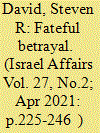

|
|
|
|
|
| Summary/Abstract |
In order to pressure Israel to withdraw from the lands it took following the 1956 Suez War, the United States made two key commitments. It promised Israel it would open the Straits of Tiran if Egypt reimposed a blockade and that if the blockade nevertheless persisted, Israel would have the right to act on its own to ensure free passage of Israeli ships. When Nasser closed the Straits in 1967, President Johnson reneged on both commitments. LBJ chose not to act to end the blockade and warned Israel not to act alone. The failure to live up to these commitments contributed to the outbreak of the 1967 War, hampered efforts to get Israel to give up the territories it conquered as a result of the war, and reinforced in Israel the conviction that it could not depend on others for its security. Israel and the Middle East would be very different places today if those commitments had been fulfilled.
|
|
|
|
|
|
|
|
|
|
|
|
|
|
|
|
| 7 |
ID:
154054


|
|
|
|
|
| Summary/Abstract |
In the summer of 1958, the Middle East was engulfed in crisis, and the Eisenhower administration was rethinking its regional policy. Israel saw a chance to demonstrate its value as a reliable strategic partner by supporting the Western military operation to secure Jordan. Prime Minister Ben-Gurion authorized overflights and tabled proposals for a strategic partnership. Though Washington proved responsive, Ben-Gurion abruptly terminated the overflights, and a severe diplomatic crisis ensued. It was neither sought nor welcomed by the parties, and left all baffled and dismayed. Ben-Gurion’s behaviour confounded contemporaries and historians: was he intimidated by Soviet threats? Did he yield to coalition pressures? Was he engaging in brinkmanship? New evidence shows that the root cause of the crisis was accidental, and ultimately it served only to cast doubt over Israel’s fortitude.
|
|
|
|
|
|
|
|
|
|
|
|
|
|
|
|
| 8 |
ID:
190990
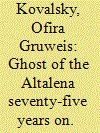

|
|
|
|
|
| Summary/Abstract |
The tragic Altalena incident of June 1948, where prime minister and minister of defence David Ben-Gurion ordered the newly-formed Israel Defence Forces (IDF) to sink a ship laden with arms for one of Israel’s pre-state military underground groups, killing sixteen people and wounding many others, remains one of the most traumatic events in Israel’s history. This article re-examines the conduct of the key personalities involved in the incident and their attitude towards it in subsequent years.
|
|
|
|
|
|
|
|
|
|
|
|
|
|
|
|
| 9 |
ID:
184989
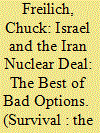

|
|
|
|
|
| Summary/Abstract |
Israel’s national security strategy in many ways has been a historic success. Once a weak, embattled state whose survival was at stake, Israel has become an essentially secure state whose existence is probably no longer in doubt. A nuclear Iran remains the only potentially existential threat, and Hizbullah a severe proximate threat. A simple process of elimination among the options available to Israel shows that a revived nuclear deal is the best of a bad lot. Sanctions, covert sabotage and a military attack are unlikely to yield long-term gains. No one knows if, when or how regime change will occur. A revived deal buys Israel the greatest amount of time and may produce new opportunities if extended. But Israel may eventually have no choice but to launch a military attack, possibly designed to force the international community to take decisive action.
|
|
|
|
|
|
|
|
|
|
|
|
|
|
|
|
| 10 |
ID:
143619
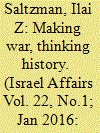

|
|
|
|
|
| Summary/Abstract |
Historical analogies, and historical reasoning, enable policy-makers to overcome major fundamental difficulties in the process of crisis decision-making. By employing lessons and conclusions from past experience, leaders believe they can avoid future failures and make better choices. This paper identifies, for the first time, the key analogies David Ben-Gurion and other key Israeli policy-makers employed prior to the eruption of the Sinai War of October 1956 and their reasoning. It demonstrates that Ben-Gurion was highly sensitive to historical occurrences, personal, national and international, and exhibited great inclination to engage the crisis with Egypt according to the lessons he drew from it. The analogical framework explains the timing of the offensive against Egypt and its distinct nature.
|
|
|
|
|
|
|
|
|
|
|
|
|
|
|
|
| 11 |
ID:
169981
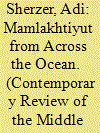

|
|
|
|
|
| Summary/Abstract |
The concept of Mamlakhtiyut, defined by Bareli and Kedar as the Israeli version of republicanism, has shaped Israeli political system and civil culture from the 1950s onward. This article examines how this inter-Israeli concept affected David Ben-Gurion’s inter-Jewish policy toward the Jews of the Diaspora during the constructive era of the first year of statehood. The discussion focuses on the journey of Ben-Gurion to the USA during the spring of 1951 and the launching of the Bonds campaign as an alternative Israeli fundraising tool. The study of the journey’s context and a deep analysis of Ben-Gurion’s speeches during the journey demonstrate the importance of the Mamlakhti approach in the setting of Israel–Diaspora relations. I argue that the Mamlakhti-republican discourse was needed by both sides to deepen the relationship during the 1950s, point its deep influence on both policy and discourse, and suggest that today too it may foster the discourse and reframe some of the fundamental subjects that divide Israel from the Diaspora.
|
|
|
|
|
|
|
|
|
|
|
|
|
|
|
|
| 12 |
ID:
154057
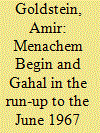

|
|
|
|
|
| Summary/Abstract |
This article discusses the causes and processes that drove Menachem Begin and his Gahal party into the Israeli cabinet during the three-week waiting period preceding the June 1967 war (or Six Day War as it is commonly known). A close examination of Begin’s behaviour reveals a calculated political move aimed at exploiting deep processes within the Israeli political establishment in general, and its right-wing factions in particular. This sheds fresh light on a number of key events preceding the war, notably Prime Minister Levi Eshkol’s surrender of the defence portfolio to Moshe Dayan, as well as on the deeper processes that led within a decade to the Likud’s (Gahal’s successor) rise to power, for the first time in Israel’s history.
|
|
|
|
|
|
|
|
|
|
|
|
|
|
|
|
| 13 |
ID:
169978


|
|
|
|
|
| Summary/Abstract |
The focus of this article is the 1958 “Who is a Jew?” controversy and David Ben-Gurion’s inquiry into Jewishness leading intellectuals from Israel and the Diaspora regarding how to register a child born to a non-Jewish mother in the Israeli identity card. The article’s main claim is that this correspondence must be understood not only as reflecting a continuous struggle between diaspora and Israeli Jews or between Jews of various religious persuasions, but rather as reflecting a built-in tension between pan-Jewish solidarity and Israeli Jewish sovereignty. This built-in tension seems to prevail today as well, and thus our analysis of the 1958 event may enable a more complex understanding of the continuous and seemingly unresolved tensions within today’s Jewish world.
|
|
|
|
|
|
|
|
|
|
|
|
|
|
|
|
| 14 |
ID:
151814
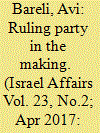

|
|
|
|
|
| Summary/Abstract |
The article discusses the transformation of Mapai, the main political party in Israel’s pre-state years, into the ruling party of a sovereign state. By way of doing so Mapai went through three distinct stages, from striving to build a working class of rural and urban labourers, to seeking immediate statehood via rapid mass immigration and partition, to acting as an effective ruling party, or the ‘party of the state’ as it called itself, following the November 1947 UN partition resolution. It was in charge of creating the machinery of government during a time of war, and this fostered hierarchical patterns characteristic of a sovereign rule, notably the independence of the government vis-à-vis the political parties, including Mapai itself.
|
|
|
|
|
|
|
|
|
|
|
|
|
|
|
|
|
|
|
|
|